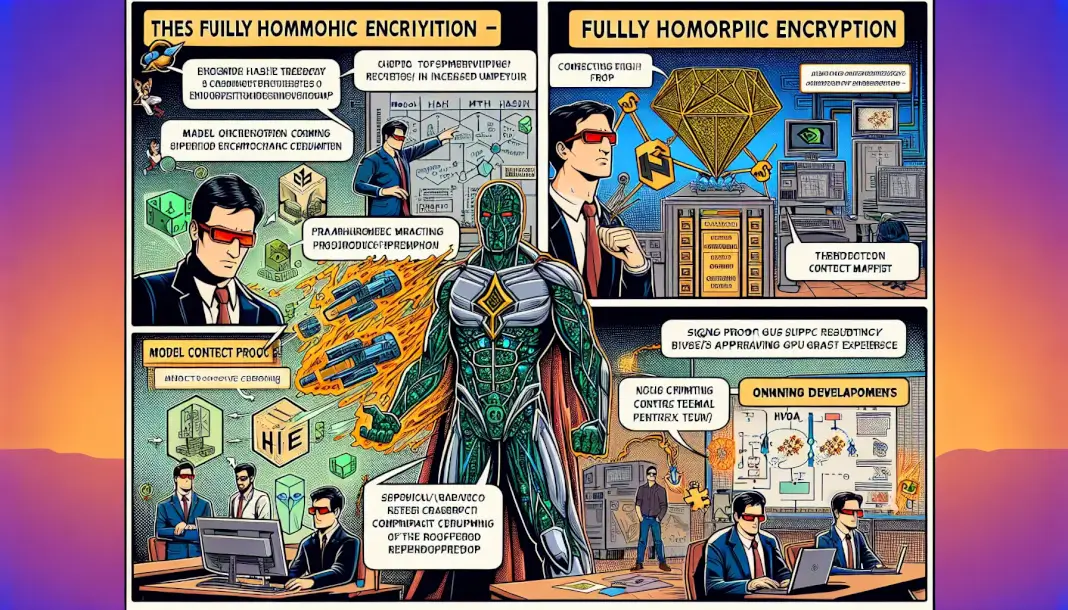KEY TAKEAWAYS
- Zero1 Labs transitions from Fully Homomorphic Encryption to the Model Context Protocol to enhance blockchain AI efficiency.
- The shift addresses FHE’s limitations, reducing latency and gas fees by utilizing plaintext context fetches.
- Collaboration with NVIDIA’s Inception team aims to optimize MCP’s performance using GPU expertise.
- MCP’s chain-agnostic design improves speed, cost, and composability, offering Web-2 latency with Web-3 guarantees.
Zero1 Labs has announced a strategic pivot in its blockchain technology approach, transitioning from Fully Homomorphic Encryption (FHE) to the Model Context Protocol (MCP) as its core primitive for on-chain AI. This shift comes after twelve months of developing Cypher, the first FHE-native roll-up, which highlighted significant challenges in latency, cost, and usability.
The company detailed its decision to make MCP the central focus, with FHE becoming an optional plug-in. This change aims to address the limitations encountered with FHE, such as high latency and state bloat leading to increased gas fees. For instance, a single image-classifier call could cost over $2,000 at 20 gwei due to the size of ciphertext values compared to plaintext.
Zero1 Labs is collaborating with NVIDIA’s Inception team to leverage their GPU expertise, ensuring MCP’s efficiency from the outset. The MCP framework is designed to enhance speed and reduce costs by utilizing plaintext context fetches, which allow for sub-second inference on affordable GPUs. This approach significantly lowers gas consumption compared to FHE, making it more practical for developers and users.
Advantages of the Model Context Protocol
The Model Context Protocol is a chain-agnostic specification that integrates three key components: Model Hash, Context Manifest, and Proof Stub. These elements work together to provide a more efficient and cost-effective solution for deploying AI applications on the blockchain.
MCP’s benefits include improved speed, reduced costs, and enhanced composability. By using a 64-byte hash instead of an 8 kB ciphertext, MCP saves approximately 2,800 gas per read. Additionally, it allows for the publication of context manifests while keeping raw weights private, enabling developers to collect royalties for each on-chain call.
The protocol also enhances auditability, as auditors can recompute hashes to verify that nothing has changed, providing Web-2 latency with Web-3 guarantees.
Future Developments and Roadmap
Zero1 Labs has outlined an ambitious roadmap for MCP, with significant milestones planned for 2025 and 2026. These include the launch of the Nexus Hub, the publication of the MCP Core architecture, and the introduction of various AI dApps that leverage MCP’s capabilities.
In the first half of 2025, the company plans to release the MCP Core v0.1 architecture and launch the Nexus Hub, which will feature demo apps, GPU endpoints, and proof dashboards. The second half of the year will focus on further developments, such as the introduction of a zk-integrity layer and optional FHE field encryption.
By 2026, Zero1 Labs aims to offer a wallet-native context preview and a marketplace for Mintable AI Agents, alongside ongoing research and development for hardware acceleration and privacy enhancements.
For more details on the roadmap and future plans, visit the full announcement here.
Why This Matters: Impact, Industry Trends & Expert Insights
Zero1 Labs has announced a strategic pivot from Fully Homomorphic Encryption (FHE) to the Model Context Protocol (MCP) to enhance AI integration within blockchain technology. This shift aims to address the challenges of latency, cost, and usability faced with FHE, while collaborating with NVIDIA to leverage GPU expertise for improved efficiency.
Recent industry reports indicate that MCP is rapidly gaining traction as a transformative protocol for AI integration, surpassing other frameworks like LangChain. This aligns with Zero1 Labs’ strategic shift, which leverages MCP to enhance AI capabilities and reduce operational costs.
A CryptoNews report highlights the positive market reaction to Zero1 Labs’ collaboration with NVIDIA, emphasizing its potential to drive innovation in decentralized AI solutions. This supports the impact of Zero1 Labs’ adoption of MCP, positioning it to influence the decentralized AI landscape significantly.
Explore More News:
Disclaimer: The views expressed in this article are those of the authors and do not necessarily reflect the official policy of CoinsHolder. Content, including that generated with the help of AI, is for informational purposes only and is not intended as legal, financial, or professional advice. Readers should do their research before taking any actions related to the company and carry full responsibility for their decisions.

